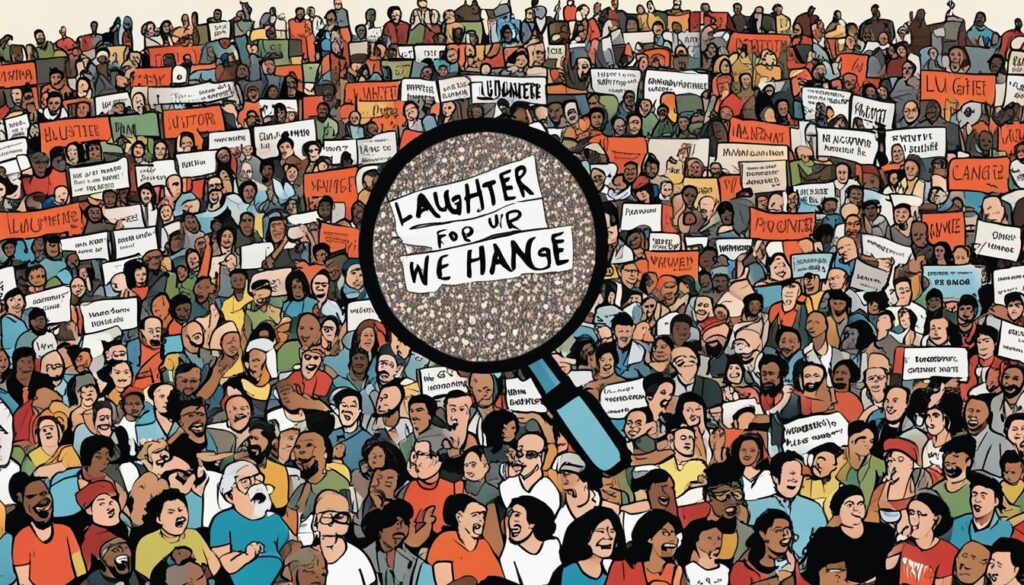Do you find yourself wondering, “Why is my humor broken?” Are you struggling to find the laughter in life? If so, you’re not alone. Many people experience a lack of humor or a sense of brokenness when it comes to comedy. But fear not! By understanding the causes of broken humor, you can take steps to fix it and bring back the joy and laughter into your life.
According to psychology researcher Rod Martin, humor isn’t always a straightforward concept. In fact, he developed the Humor Styles Questionnaire, which categorizes humor into four main styles: affiliative, self-enhancing, aggressive, and self-defeating. Understanding your own sense of humor and its style can give you valuable insights into potential problems and help you find ways to revive it.
So, let’s delve deeper into the different styles of humor, their effects on mental health, the power of humor in overall well-being, and how humor can serve as a catalyst for social change.
But first, let’s take a moment to reflect on the importance of a healthy sense of humor.
Key Takeaways:
- Understanding your sense of humor is the first step in fixing a broken sense of humor.
- The Humor Styles Questionnaire can help identify your humor style and potential areas for improvement.
- There are four main styles of humor: affiliative, self-enhancing, aggressive, and self-defeating.
- Positive humor, such as self-enhancing humor, can have a positive impact on mental health and well-being.
- Humor can be a powerful tool for social criticism, change, and raising awareness.
The Different Styles of Humor and Their Effects on Mental Health
Humor comes in various styles, each with different effects on mental health. Understanding these styles can help us navigate our own sense of humor and its impact on our well-being.
Affiliative humor is a style that involves making jokes to make others like us. It focuses on building connections and fostering positive relationships through humor. This style can create a sense of camaraderie and social bonding.
Self-enhancing humor is an optimistic and coping style that allows us to find amusement in our own experiences and the absurdity of life. It helps us to laugh at ourselves and see the lighter side of challenging situations. This type of humor can be beneficial for mental wellness, providing a positive outlook and a sense of resilience.
Aggressive humor involves sarcasm, teasing, and ridicule directed at others. While it may elicit laughter, it can also have negative effects on relationships and mental health. Engaging in aggressive humor can create hostility, strain social connections, and lead to feelings of loneliness or isolation.
Self-defeating humor is a style characterized by putting oneself down to gain approval or acceptance from others. This type of humor is often used as a defense mechanism, but it can be detrimental to self-esteem and mental well-being. It may indicate underlying insecurities and a negative self-perception.
While self-enhancing humor can offer mental wellness benefits, aggressive and self-defeating humor can signal trouble and be linked to loneliness and self-harm. It is important to be mindful of the humor styles we engage in and their potential impact on our mental health. By recognizing and cultivating positive humor styles, we can promote well-being and create healthier social connections.
Effects of Humor Styles on Mental Health
| Humor Style | Effect on Mental Health |
|---|---|
| Affiliative Humor | Promotes social bonding and positive relationships |
| Self-Enhancing Humor | Boosts resilience, provides coping mechanism, and contributes to overall well-being |
| Aggressive Humor | Can strain relationships, lead to loneliness, and negatively affect mental health |
| Self-Defeating Humor | May indicate underlying insecurities and low self-esteem |
The Power of Humor in Mental Health and Well-being
Positive humor plays a significant role in promoting mental health and overall well-being. Research has shown that humor, particularly self-enhancing humor, can offer protective effects against symptoms of anxiety and depression.
When faced with stress and hardships, humor acts as a coping mechanism that provides relief and allows individuals to navigate challenging situations with a lighter perspective. It can help alleviate tension, promote relaxation, and enhance emotional resilience.
Laughter, often described as the best medicine, has been widely recognized for its positive impact on physical and mental health. When we laugh, our bodies release mood-boosting endorphins, reduce stress hormones, and stimulate the immune system.
“Humor can help turn anxiety into pleasure.”
Sigmund Freud once stated, “Humor can help turn anxiety into pleasure.” This insightful observation highlights the transformative power of humor in shifting our mindset and offering a refreshing perspective on challenging situations. By finding the lighter side of life, we can alleviate stress and foster a sense of well-being.
Incorporating positive humor into our lives can have profound effects on our mental health and overall quality of life. It allows us to navigate difficult emotions and circumstances, promoting resilience and providing a sense of control during challenging times.
By embracing humor and laughter, we can foster a positive mindset, effectively cope with stress, and cultivate a greater sense of well-being.

The Role of Humor in Social Criticism and Change
Humor has long been recognized as a powerful tool for social criticism and driving change. Through the use of parody and irreverent artivism, humorists have effectively shed light on social injustices and exposed the absurdities of the world we live in. This critical humor serves as a catalyst for inspiring rethinking and motivating action for change.
Parody, in particular, allows humorists to cleverly mimic and exaggerate societal norms and behaviors, exposing their flaws and shortcomings. By exaggerating these flaws through humor, parody illuminates the need for change and encourages a shift in attitudes and perspectives.
Irreverent artivism is another form of humor that challenges the status quo and confronts established power structures. It often uses satire and subversive creativity to provoke conversations around social issues. By using humor as a tool for change, irreverent artivists can break down barriers and encourage dialogue that leads to positive social transformation.
However, it is important to recognize that humor can also be weaponized and used to spread false narratives or perpetuate harmful ideologies. In today’s politically charged climate, the proliferation of misinformation disguised as humor is a significant concern. It is crucial to critically evaluate the intent and impact of humor and ensure that it aligns with the goals of positive social change.

In conclusion, humor, particularly parody and irreverent artivism, plays a vital role in social criticism and change. It has the power to lay bare flaws, inspire rethinking, and motivate action. However, it is essential to approach humor with a critical eye to avoid the weaponization of humor and the spread of false narratives. When used responsibly and ethically, humor can be a powerful tool for positive social transformation.
Conclusion
Understanding the role of humor in our lives and its impact on our mental health is crucial. While humor has the power to bring joy and provide relief, we must also be mindful of the styles of humor we engage in and the effects they may have on ourselves and others.
By embracing positive humor and finding ways to revive our sense of humor, we can contribute to our overall well-being and potentially play a role in creating social change. Laughter has been proven to have numerous benefits for our mental and physical health, serving as a powerful tool in coping with stress, anxiety, and depression.
Moreover, humor has a long history of being used to critique social injustices and highlight absurdities. From parody to irreverent artivism, humor can expose flaws, challenge the status quo, and inspire people to rethink their perspectives and take action.
So, let us not be afraid to find the laughter in life. Reviving our sense of humor and embracing positive humor can not only benefit our own well-being but also create a ripple effect that transcends personal boundaries, contributing to a more humorous, empathetic, and socially aware world.
FAQ
Why is my sense of humor broken?
There can be various factors that contribute to a broken sense of humor, including personal experiences, psychological factors, and social influences. It’s essential to identify the root cause of your humor dysfunction to determine the appropriate steps to fix it.
What are the causes of a broken sense of humor?
Causes of a broken sense of humor can range from past traumas or negative experiences that have affected your ability to find humor, to underlying mental health issues such as depression or anxiety. Cultural and societal factors can also play a role in shaping one’s sense of humor.
How can I repair my broken sense of humor?
Repairing your broken sense of humor involves self-reflection and an understanding of your own humor styles. It may be helpful to engage in activities that make you laugh, reconnect with positive humor, and seek support from friends, family, or a mental health professional if necessary.
Why am I laughing less and experiencing a lack of humor?
Laughing less and experiencing a lack of humor can be caused by various factors, including stress, boredom, or underlying emotional issues. It can also be influenced by external circumstances or changes in life that impact your overall mood and mindset.
How can I fix a humor imbalance?
Fixing a humor imbalance involves exploring and embracing different styles of humor that are healthy and positive for your mental well-being. This may include practicing self-enhancing humor, finding joy in everyday situations, and seeking out humor through various mediums such as shows, books, or comedy clubs.
What can I do if my humor feels dysfunctional or out of balance?
If your humor feels dysfunctional or out of balance, it may be beneficial to seek guidance from a mental health professional who can help you identify the underlying causes and provide strategies to restore balance and improve your overall sense of humor.
